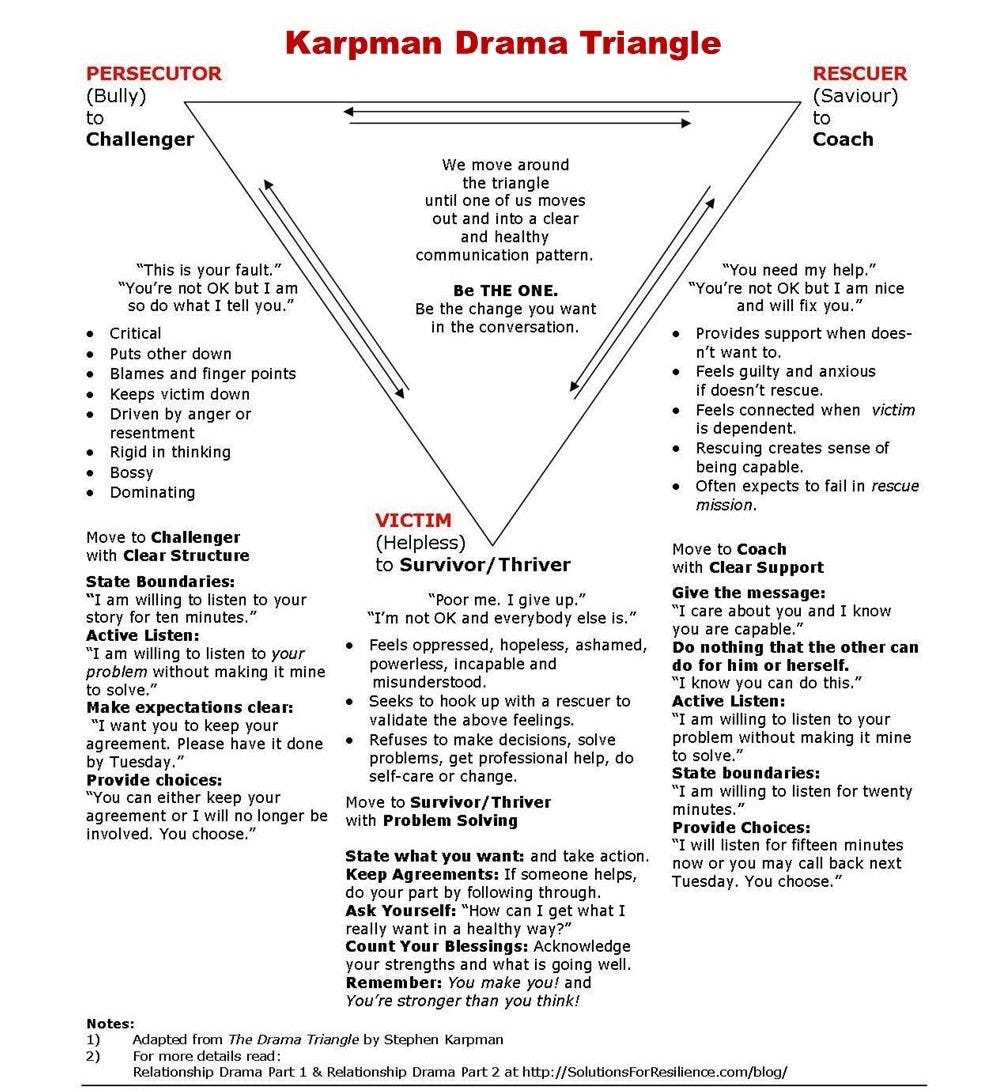Mars in Leo: 5 Reminders for Personal Growth This Retrograde
Tips for Tapping Out of the Drama Triangle
Looking for astrological insight on 2025? Check out my other recent articles, and consider picking up my 3-hour workshop to help you situate yourself in the changing tones of the future.
The plant tells the wise gardener when it is time to prune. What was strong sags. What was green, yellows. Not every shoot is to finish the season.
As pruning brings plants prosperity, on occasion you need to make cuts to grow. The tangled brambles of who you once were cast shadows. But to thrive, somehow the light of the future has to get through the thicket.
Prudent clipping is no celebration, as the sharp edge of change is unpleasant. But quickly, new growth rises after the shears. Generous are the reductions of the wise.
What aren’t you anymore?
You are reading Part 2 in a series about the winter’s biggest astrological storyline: Mars retrograde in Leo and Cancer.
If you missed Part 1, catch up on it here: The Drama Triangle of Mars in Leo; or how I was personally victimized by El*n M*sk.
The last time Mars turned retrograde in a fire sign was the day the sky turned red.
September 9, 2020 was surreal in Northern California. Massive wildfires and thick smoke shrouded the region in an eerie, orange glow as the sky darkened. Fueled by extreme heat, dryness and winds, the fires caused widespread destruction, displacing thousands, straining emergency services, and highlighting the escalating threat of climate change.
Astrologers could not help but note that September 9, the day the sky turned red, was the first day of the red planet’s retrograde in the fire sign of Aries. The gods keep it real, don’t they?
When you set a fire in your life, not everything dies. Fires are intense, but not evil. Like pruning, they are also part of growth cycles and they can cultivate long-term resilience. Wildfires clear out dead vegetation, returning nutrients to the soil and creating space for new plant growth. They also help maintain ecosystems by encouraging the germination of fire-adapted species and supporting biodiversity over time.
What survives the fire can grow stronger. It is the same with nature and with us: fires will always come. The question is how they come, and how responsibly we tend the aftermath-terrain.
Are you looking for a personal container to explore Mars and the Mars retrograde in your chart? I am offering a Mars-focused reading just for you:
Click here to book your session.
Recapping the Drama Triangle
Drama is an interpersonal fire without responsibility. The unlearned would call it a “wildfire,” not knowing that all fires are engineered. We only got here because somebody did or — more often — didn’t do something.
Dramatic communication is smoky with groans of doubt, red with sighs of resignation. I can’t do this anymore. But you do, because drama is all talk and no action.

A conflict model devised by psychologist Stephen B. Karpman, the Drama Triangle describes a dysfunctional communication pattern among three roles: Victim, Persecutor, and Rescuer.
The Victim feels powerless and shifts responsibility for their situation onto others or external forces.
The Persecutor criticizes or oppresses the Victim, using control or aggression to assert dominance and moral superiority.
The Rescuer steps in to "save" the Victim, but ends up fostering dependency instead of helping them access their capabilities.
The roles are not static, as we shift we between. In fact, this motion actually perpetuates conflict and prevents resolution, fueling the drama’s fire. Alternation between roles can create a temporary illusion that the dynamic has changed — or that we are “winning” — bringing a sweeter hit of adrenaline. But that gets old too, and we switch back.
There is no growth in this; only semi-sweetened decay. It feeds our deluded sicknesses of mind that tell us we’re not good enough, or that we’re perfect.
“Perfect” and “hopelessly flawed” are the preferred postures within the Drama Triangle. The Persecutor and the Rescuer both project themselves as capable and morally correct. On the other hand, the Victim dwells in lack and shame while seeking validation for their powerlessness and host of flaws.
Mars in Leo as Posturing
The volatility of the Drama Triangle gives the ego whiplash — one moment you’re perfect, the next you’re trash. Homer called Mars/Ares alloprosallos (αλλοπρόσαλλος). The god of war does not choose sides. He swings to one side, then the other. In the end, his only loyalty is to the conflict itself.
Be on alert for this behavior. Don’t be loyal to your conflicts. Be loyal to yourself.
Being loyal to the conflict manifests as “postures” that roar, but have no teeth. Posturing is a self-righteous mode of doing nothing. If I make you feel something, then I’ve won — even though nothing has changed.
These postures are illusions that the players unconsciously uphold as a way of denying responsibility for their unhappiness. Static dissatisfaction becomes normal. And we tolerate it because we convince ourselves we have no choice or ability to pursue wellness and growth.
Politically in the US, this dynamic fuels drama on both sides. On the left, a defeated and hopeless pervades. Commiseration mingles with anger and disgust. But where’s the action? Then on the right, flagrant cries of Your body, my choice batter the airwaves for the sole purpose of eliciting rage and fear. The devil just wants to make you feel something. Numbness and paralysis are where the Drama Triangle ultimately leads.
As the planet of action grinds to a halt in the coming weeks, I imagine Mars on stage, tightening into a backbreaking pose. Screaming. Writhing. It’s painful to watch — and that’s the point. It wants you to feel something, and doesn’t care if you do nothing. That’s the disempowerment of posturing.
So do something. Step outside the dynamic, with yourself and with others. But do so undramatically — otherwise you’ve gone nowhere.
Here are 5 reminders to reduce drama and reclaim your power amidst the dramatic currents of Mars in Leo.
Are you looking for a personal container to explore Mars and the Mars retrograde in your chart? I am offering a Mars-focused reading just for you:
Click here to book your session.
Reminder #1: You don’t have to go it alone, but you do have to be willing to.
Stepping out of the Drama Triangle doesn’t have to mean losing connections. You can be a leader, inviting others to step out of the dynamic with you. You can enter an empowerment dynamic together.
Emphasis on can.
You should also have a plan for if you’re not followed. Changing your behaviors will change your interpersonal reality — eventually for the better, but Rome wasn’t built in a day. Be clear about your expectations of yourself and others. Then follow through, and hold the course. A great city will rise up around you.
Reminder #2: Discomfort is a sign you’re doing it right.
When you exercise, you learn the difference between pain and discomfort. Pain is a warning sign. It says, pay attention! Something is wrong here! Check your form. Ignoring pain and repeatedly using improper form almost inevitably results in injury. But in the short term, bad form can enable heavier lifts, giving the superficial impression of success.
The postures of the Drama Triangle are like bad form. A Rescuer may make a “heavier lift” for a Victim’s short-term benefit, but eventually they will wear themselves out as the Victim continues to feel disempowered and incapable of helping themselves.
Discomfort, on the other hand, is desirable: it flows from healthy challenge. It is usually more difficult to lift using good form — at least at first. Proper form (i.e. non-drama) empowers the lifter to grow stronger safely, even if each lift is not as impressive on the surface.
We can also learn the difference within our emotional bodies. Doing the hard thing — i.e. setting the boundary, taking responsibility, being honest and clear about what you can and cannot do — is also not easy at first. But as the muscle grows, so do you.
Whereas drama is heavy, practicing empowerment dynamics should make you feel lighter once you push through initial discomfort. Seek healthy discomfort and you will end up feeling less burdened.
Reminder #3: Don’t apologize just to feel something.
Apologizing can be another form of posturing.
We may think apologies are about the past and remorse — but a good apology is also about the future and subsequent actions.
If our primary motivation for apologizing is feeling bad about what we did, the apology is probably going to continue the selfishness that led to the problem. Instead, we should apologize to align with others on a vision for better outcomes. Say what you will do differently in the future, as well as what you will do if you make the same mistake again.
But what if you don’t intend to change? Then own it and be honest. I’m sorry my actions brought you pain. I don’t want to hurt you, but I do not see myself changing this part of my behavior. What needs to change between us since I am not going to change this? Empower people to accept you as you are instead of gaslighting them.
Reminder #4: Don’t blame someone for being exactly who they told you and showed you they are.
If a dynamic is not satisfying anymore, maybe it’s because you changed — not because they did. Endings don’t have to be explosions.
Near the end of college, I had built up a lot of resentment toward a friend. Instead of addressing how I felt or ending the friendship respectfully, I created an extremely dramatic situation that demolished the entire friend group.
It’s easy to blame others for how we feel instead of taking responsibility for what we want and seeking it out elsewhere. We’re not bad for wanting things, even if it’s wanting to move on. Celebrate your growth as much as you mourn what falls away in the process.
Reminder #5: You always have choice. The most important one is to love yourself.
One of the surest signs we’re in the Drama Triangle is feeling like we don’t have a choice. Being plugged into drama makes us forget that we’re making choices all the time. Look at them. Are they choices you respect?
Making choices you respect is a powerful way to practice self-love.
In All About Love, bell hooks writes:
“Love is an action, a participatory emotion. Whether we are engaged in a process of self-love or of loving others we must move beyond the realm of feeling to actualize love.”
We must choose to love ourselves and others by doing things that express and affirm this love every day. Love is a practice.
Loving ourselves is not egoic, and it is not a feeling. But thinking we are or could be perfect is both of those things: it’s egoic, and it’s just a feeling. It means nothing.
Mean what you say. Move from posture to action. Follow through. Be the change you want to see in the conversation. Or don’t! You’re not a worse person for living in the Drama Triangle. But deep down, you know you deserve better. Give yourself that gift.
For now,
Drew







Yeah, that pretty much describes my previous life as a nurse, I always say nurses are the meanest damn people I've ever met, at least to each other. Talk about a drama triangle — we talk about nurses as "saviors", but they are exploited by management and abused by patients/families, making them victims, but boy can they bully each other. It's Lord of the Flies up in there, and god help you if you become the Piggy on staff.